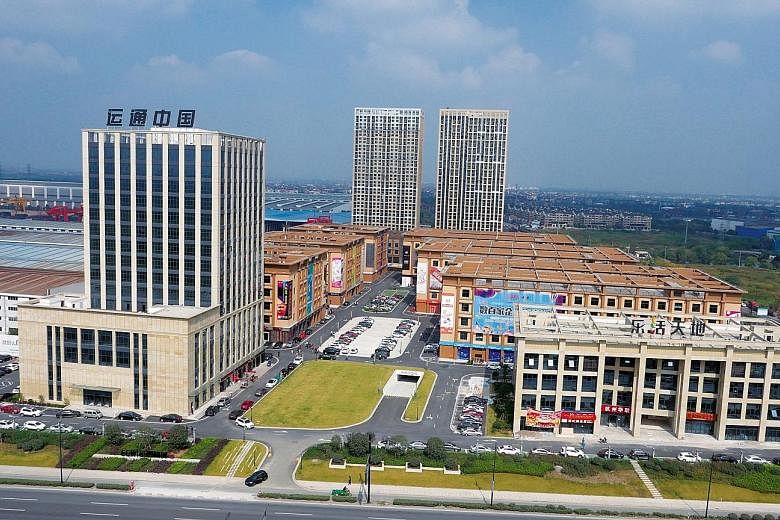Ask Mr Alvin Cheng to define his management philosophy, and he will tell you that it's all about being entrusted to add value.
The deputy chief executive of the manager of EC World Real Estate Investment Trust (Reit), which is listed on the Singapore Exchange (SGX), has over three decades of experience in corporate finance and Reit management. He graduated with a Bachelor of Science (honours) in naval architecture and shipbuilding from the University of Newcastle upon Tyne in Britain.
He then went on to pursue a double master's degree in ocean systems management and ocean engineering at the Massachusetts Institute of Technology (MIT). He describes his time at the prestigious American university as an eye-opener. "Being at MIT taught me how little I actually know, and how much there is to be learnt, and that there are many others who will be intellectually superior," Mr Cheng recalled. "MIT was where I learnt the word 'humble'."
He pointed out: "During your career journey, if you reach a point where you think you're invincible, that will mark the beginning of your downfall."
STELLAR PERFORMANCE
Mr Cheng, 56, was appointed deputy chief of EC World Reit's manager in January. Previously, he held senior management positions at APL Logistics, the former Pacific Shipping Trust and SGX-listed Lippo Malls Indonesia Retail Trust. His earlier career in the financial sector included senior regional roles at then-Chemical Bank, Rabobank and GE Capital.
In July last year, EC World Reit, managed by EC World Asset Management, became the first Chinese-specialised logistics and e-commerce logistics trust to list on SGX. It aims to invest directly or indirectly in a diversified portfolio of income-producing real estate used primarily for e-commerce, supply-chain management and logistics purposes, as well as real estate-related assets, with an initial geographical focus on China.
The trust offers exposure to the specialised logistics and e-commerce sectors in Hangzhou in Zhejiang province, through a portfolio of six assets located at one of the largest e-commerce clusters in the Yangtze River Delta. As at Dec 31 last year, the portfolio - with two e-commerce logistics properties, one specialised logistics asset and three port logistics assets - had an aggregate net lettable area of 698,478 sq m and a total appraised value of about 6.4 billion yuan (S$1.3 billion).
-
EC WORLD REIT
-
$24.7m
Gross revenue for the three months ended Dec 31, 2016. The figure was 7.5 per cent above projections.
-
$21.8m
Net property income for the period.
The trust manager, EC World Asset Management, is an indirect wholly owned subsidiary of Forchn Holdings Group, the Reit's sponsor. Established in 1992 and headquartered in Shanghai, Forchn is a diversified enterprise group specialising in the real estate, industrial, e-commerce, logistics and finance sectors.
Forchn owns 41.6 per cent of the trust. Other cornerstone investors for the Reit's initial public offering (IPO) are China Cinda Asset Management, Fosun International Holdings and BOCOM International Global Investment.
For the three months ended Dec 31 last year, EC World Reit reported a stellar operating performance that beat forecasts in its IPO prospectus. Gross revenue of $24.7 million for the quarter was 7.5 per cent above its earlier projection, while net property income of $21.8 million exceeded its forecast by 4.1 per cent. Its distribution per unit (DPU) of 1.463 cents topped its previous estimate by 2 per cent.
For the year ending Dec 31 this year, the trust has forecast gross revenue of $90.5 million, net property income of $82 million and a DPU of 5.94 cents.
EC World Reit has a market capitalisation of more than $580 million. The units, currently trading 6.2 per cent below their IPO price of 81 cents, have a price-to-book ratio of 0.8 times.
BURGEONING GROWTH
Looking ahead, Mr Cheng expects China's e-commerce industry to continue expanding at a rapid clip, underpinned by widespread Internet penetration as well as increased consumption from a rising and tech-savvy middle class.
According to data from Analysys, China's retail e-commerce market is estimated to expand to 9.4 trillion yuan in 2020, from 5.1 trillion yuan last year, for a compounded annual growth rate of 16.5 per cent. This year, the country's online retail sales are projected to reach US$972 billion (S$1.36 trillion), compared with the US$315 billion forecast for the United States.
Mr Cheng noted that physical infrastructure - which includes the specialised warehouse assets in the Reit's portfolio, on-the-ground delivery networks and customer collection points - plays a key role in connecting the industry's ecosystem and ensuring smooth operations.
High-quality warehouse space is needed for the fulfilment and customisation of each order, as well as timely delivery of goods at the lowest rates, he pointed out.
"Many of these warehouse and distribution services require complex systems - they're like the brains of an operation - so specially configured real estate is necessary to house these operations," he said.
"As e-commerce continues to develop, there's also the issue of reverse logistics, where customers return goods. This is one bugbear for many manufacturers, because it's not something that every logistics provider - particularly the more traditional ones - can handle."
EC World Reit, whose portfolio caters to high-growth e-commerce transactions, has the ability to meet these specialised needs, he added.
Another competitive advantage stems from its exposure to Hangzhou, which is the logistics hub for Zhejiang province and the Yangtze River Delta. Throughput of ports in the city - dubbed China's e-commerce capital - is expected to surge to 175 million tonnes in 2035, up 59.1 per cent from 110 million tonnes last year, based on data from Hangzhou's government.
Planned construction of a second channel within five years, aimed at connecting the waterway systems in northern China to Hangzhou, will provide a further boost, according to the Hangzhou Transport Bureau.
The Reit's main growth thrust lies in its e-commerce warehouses, such as Bei Gang and Fu Heng, which partner RuiYiCang, the sponsor's e-commerce logistics and supply-chain management service platform.
"EC World Reit complements RuiYiCang, and together, we can offer one-stop, integrated, intelligent logistics services for both domestic and international customers," noted Mr Cheng.
ALTERING PERCEPTIONS
Additional drivers of growth include acquisitions as well as asset enhancement initiatives, he said.
EC World Reit is well positioned to leverage its sponsor's business networks and relationships in China to acquire e-commerce properties that are yield-accretive. The sponsor has granted the trust a right of first refusal (ROFR), which could also usher in suitable opportunities.
Asset enhancement options include converting traditional warehouses to e-commerce logistics centres, or retrofitting and refurbishing existing facilities to achieve greater efficiency. Such measures are expected to boost rental revenues and maintain high occupancy rates, said Mr Cheng.
The trust is eyeing opportunities to diversify outside China as well, particularly in high-growth Asean markets such as Indonesia, Malaysia, Thailand, Singapore and the Philippines.
"These markets in aggregate have a huge population, and are rapidly expanding in the e-commerce sector, particularly Indonesia, where demand growth is very significant," said Mr Cheng.
He noted that the key challenge for the trust is not acquisitions or available funding in the market, but investor mindsets.
"The biggest challenges we face are the ability to change perceptions of the Reit as a traditional warehousing play, and investors' willingness to understand our unique operating model as part of the e-commerce ecosystem."
Essentially, EC World Reit is misplaced, he noted. "We're classified as an industrial Reit - while that's not entirely wrong, there's no other category at the moment that precisely defines what we do."
He said: "Our consistent suggestion to investors and analysts is to categorise us with business models like that of Keppel DC Reit, which owns data centre assets. Our concept is similar - we house a system that revolves around the flow of electronic information, and we perform physical operations that include sorting, labelling and fulfilment."
Still, changing mindsets is a gradual process, Mr Cheng admitted. "At the moment, 70 per cent of our portfolio consists of more traditional and specialised logistics assets, which are port and tobacco storage facilities. The rationale for this composition is that we wanted to be more conservative when we listed, as these traditional assets generate more stable returns."
"But as the e-commerce logistics sector expands, our portfolio composition will be very different, as we will grow together with the sector."
CREATIVE DISRUPTION
As far as possible, Mr Cheng does not allow operational issues to keep him up at night. "It's important to settle your concerns at the close of each day. If you worry a lot at night, you will lose your momentum and effectiveness the next morning."
"From time to time, we need to break out of the mould, to ensure we remain relevant in a fast-changing world," said Mr Cheng, who enjoys mentoring graduating students from his alma mater.
"You might not like being disruptive, but your competitors will continuously create disruptions. Either you're there, or you're left behind."
•This is an excerpt from the Singapore Exchange's "kopi-C: the Company brew" column, which features C-level executives of firms listed on SGX. A longer version can be found on SGX's My Gateway website.


